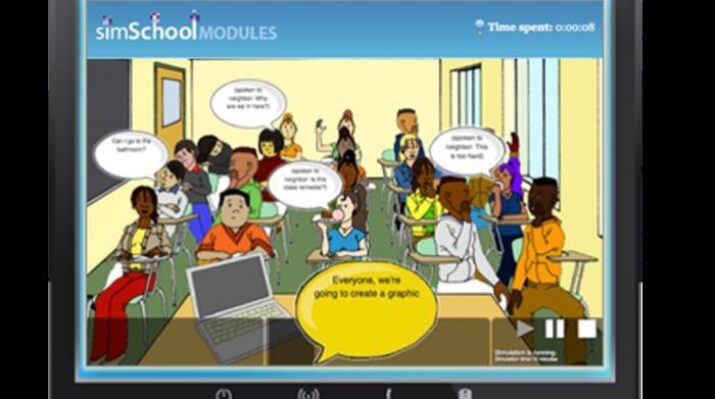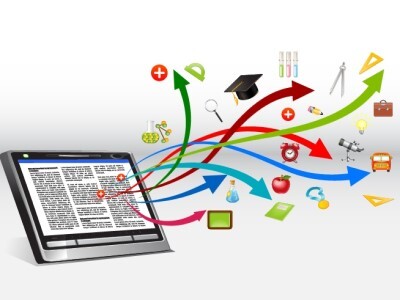The Potential of Games and Simulations in Higher Education
Topics

Educators increasingly rely on education technology tools as they shift instruction, redefine teacher roles, and design learning experiences that reflect how students actually learn. Technology should never lead the design of learning. But when used intentionally, it can personalize instruction, enrich learning environments, and help students master critical skills.
Digital games have potential as a higher education learning environment. NGLC project simSchool seeks to realize that potential by providing a “flight simulator for teachers."
The popular entertainment potential of games has not been lost on observers of culture and the economy, but how about higher education? Millions of people play digital games. Annual revenues surpassed expenditures on movies in 2008 and have not let up. First release revenues of blockbuster games continue to outpace movie premieres. People who grew up with games, members of today’s global participatory culture, now expect personalization, social advice, and instant answers integrated into their mobile applications. Whether the app is a simple shopping list shared with family members, a navigating voice giving directions that include road warnings from nearby drivers, or personal finance advice from a trusted investment group, people expect automated analyses that combine machine intelligence with social interactions to be involved in shaping choices, offering thumbs up or down about things to try or avoid.
Game-based interactions that include instant rewards, clear feedback, and challenging goals are starting to infiltrate the way we access all information and interact with others via the Internet. For example, you can earn a digital badge by recommending something to your friends, and their active participation redounds to your reputation and value in their circles, and their circle’s circles. Allies you depend upon for advice and help are as important for making a life decision as they are for defeating a competing civilization in a virtual kingdom: the skills developed in either the virtual or real world are helpful in both. Developers and marketers have taken note and are busy adding game-based rewards to all kinds of applications in order to boost engagement and responsiveness.
Advancing Postsecondary Curricular Goals
Researchers at the Pew Internet and American Life Project and elsewhere have noted the powerful impacts of game-based learning on motivation, emotion, memory and performance. Visionaries in higher education are therefore increasingly starting to care about games and simulations, considering their potential to empower students engaged in postsecondary learning. According to the NMC 2012 Horizon Higher Education Report, games and simulations are on the two to three year adoption timeframe. The draw: theory-driven authentic practice in a highly engaging, self-motivating, safe, scalable learning environment, with automated data collection and analyses.
The underlying intelligence algorithms of games and simulations can draw upon widely published theories to drive learning experiences. Research-based sources can be brought together, as theories of teaching and learning are drawn together in simSchool, a Wave I NGLC winner in 2011, into a flexible authoring system for professors, instructional leaders, and end users, thereby creating a platform technology for the creation of realistic interactive case challenges that develop knowledge and skills.
Games can thus be used as course content and activities for undergraduate instruction, as a discussion and exploration environment for Masters-level students, and as a research sandbox for PhD and EdD work. For example, simSchool offers a “digital observation” component in online education courses. Higher education faculty support centers use simSchool as professional development for TAs and adjuncts. In schools of education, simSchool is used as a substitute for physical field placements, since it has been approved by accreditation reviews as an enhancement of the requirements for fieldwork.
Leveraging Virtual Performance Assessments
A digital game-based assessment system can use unobtrusive online collection methods that are fully integrated with the natural actions in the learning experience, providing a platform for virtual performance assessments. For example, simSchool is supported by the Leverage database, which is massively scalable to 10 million users or more, all of whom can build a record of performance over time. The highly detailed time-based data streaming into and out of Leverage poses new psychometric challenges for real-time educational analytics.
Before ubiquitous computing and game-based applications in education, psychometrics consisted of statistics applied to point-in-time measures like multiple-choice tests, quizzes, course grades, and essays. In simSchool and other dynamic applications, data is now a series of time-stamped actions and events with a sliding scale of time from the microseconds to minutes to even years, and the data has a spatial reach into many dimensions and modalities of expression. This new digital performance space provides more authentic ways of showing what one knows and can do. One’s responses and performances can be elicited in convincingly detailed virtual situations that have been shown to have the same psychological impacts as the real world. The new psychometrics must therefore utilize data mining and machine learning with cognitive and task modeling as proficiently as the old psychometrics used statistics. Our year of support from NGLC helped simSchool move into these fields where we are still working to develop theory and practices required for educational use of digital games and simulations.
To Learn More
simSchool is a digital flight simulator for teachers with a scientifically sound and highly flexible model of teaching and learning. simSchool can be used as a virtual field placement, an online practice arena, an experimental research platform, and a teacher assessment tool in key undergraduate and graduate education courses where there is a need for intensive authentic classroom experience, observation, theorizing and reflection.
As a user, a potential teacher virtually stands in front of a classroom and attempts to teach simulated students, who react and learn based on their actions. If all the students achieve academic growth during the session, the teacher wins (and so do future real students). simSchool is device independent, cross-platform compatible, cloud-based, and free to professors, trainers and organizations. All the course, module, and classroom simulation materials are created by experienced teacher educators and are publicly available for adapting to specific teacher education needs.
You are invited to register and use simSchool Modules for free by going to www.simschool.org, and to be in contact with our team at anytime to discuss theory and research, the interpretation of results, or to explore ways to move forward to create new partnerships. Also, be sure to look for simSchool in conference presentations at SITE, AACTE, AERA and AACE conferences.
Support from a Wave 1 NGLC grant helped simSchool develop open educational resource modules and grow from a few hundred users to over eleven thousand people in 140 countries in just twelve months. Partners in the project were the Association for the Advancement of Computing in Education and the Society for Technology and Teacher Education, as well as the University of North Texas, Pragmatic Solutions and Fablevision. All the partners join me in thanking NGLC for its vision, technology leadership, and excellent staff support, all of which made a big difference in simSchool’s growth and development.
Contact David Gibson at David.C.Gibson@curtin.edu.au




